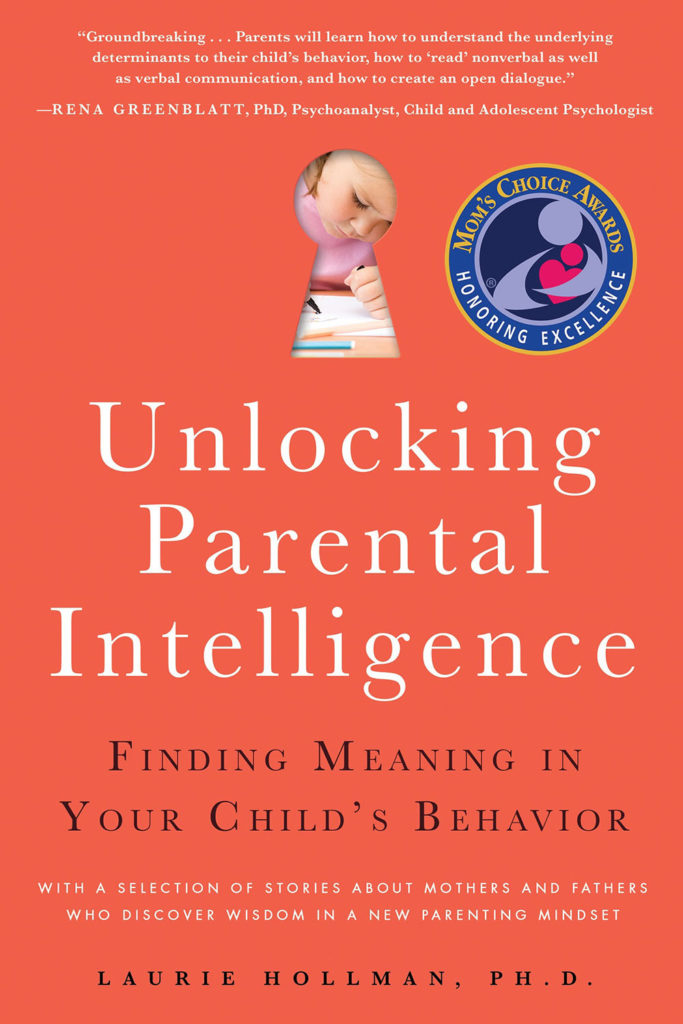Unlocking Parental Intelligence – Excerpts
Chapter Four:
At-Risk Parents Misread Infant’s Fussy Behavior: Reese’s First Months
“Lidia appeared promptly the next morning, cheerfully ignoring the disheveled young mother’s appearance and her disorganized household. Piles of laundry, overflowing baskets of garbage, dishes in the sink, and infant toys scattered about didn’t ruffle her. She instantly observed a strained and exhausted teenage mother who was unprepared for her maternal role. She noted immediately that Claudia fed her baby without looking into her eyes and that she talked to her as if she was a young child, not an infant. Lidia knew at once that she had two babies to care for and was sensitive to their anxious bonding. She noticed that Claudia carried her baby around almost all the time, suggesting how much they both needed to feel held.”
Chapter Five:
A Distressed Child, Not a Bad Child: Two-Year-Old Travis
“Mrs. Daver now understood how Travis’ actions made her feel so rejected that she couldn’t hear his tantrums as emphatic calls for help. She felt he was doing something to hurt her, not to reach her, and when she wasn’t there for him in the way he needed, he just escalated his behavior trying even harder to get the attention and care he needed from her…”
“Reflecting on these insights led Travis’ father to wonder how he could help Travis find his way. … his darkening thoughts led him to realize they would have to help Travis together, challenging his view of their son being only her child…”
“Travis’ parents’ Parental Intelligence had reached a significant height that would continue to develop as they and Travis grew. The gateway to becoming a tender, loving family had been opened. However, this was just the beginning of how raising Travis was reshaping who they were and who they could become.”
Chapter Six
A Boy with High Functioning Asperger’s Can’t Stop Singing: Four-Year-Old Lee
“Parenting had always seemed pleasurable to Carl and Deirdre, even exciting as they learned from their children’s interests and personalities, but now, hiding despair as they tried to buoy each other up, they weren’t so sure.”
“Lee covered his ears in the grocery store this afternoon,” Carl told Deirdre. “He couldn’t cope with the crowds and the noise that must have felt like chaos to him. He complained a great deal and folded himself on the bottom rack of the cart, put his head down and covered his ears…” Carl said sadly, “The sounds in the grocery store were like a garbled, painful, noise Lee couldn’t get relief from. I was so glad for him when we finally exited and I quickly buckled him into the security of his seat belt in the quiet, familiar car.”
“Imagining a world that was too loud, too bright, and too social for Lee…helped Carl and Deirdre realize how profoundly difficult it was for Lee to learn every day social cues.”
“Carl had often asked himself the question, ‘Could Lee love?’ It was hard to be in Lee’s mind. He wondered: “Did he care that it was Vic in particular who gave him the new cars? Did he enjoy his singing in a different way when Israel sang with him?”
“Lee was a part of something: more than himself. He was a member of his family. Carl and Deirdre thought he knew that.”
Chapter Eleven:
A Lonely Place to Call Home: Seventeen-Year-Old Eva
“Her angry father met Eva at the door, and told her that no excuses would be accepted. ‘You know you broke the rules. You’re grounded for two weekends. No discussion…’”
“Eva flopped on her bed and thought: ‘It wasn’t my fault. Dad just doesn’t get it. He never does. I’m always on time for school unless the bus is late, but thank goodness Dad doesn’t know when that happens, otherwise he’d call the bus company! I tell the truth and get grounded. Last time I do that!’… ”
“However, something was churning inside of Eva’s dad. He felt unsettled, restless, not himself. He recalled that when Eva called him she had said she’d be late and had admittedly tried beer. Then he recalled that when she came home and he grounded her, she had run up the stairs crying, not just placidly following his dictates. He remembered how startled he felt by her reaction. The front hall that had seemed full of life when she went out now seemed dark and empty. He asked himself, “What have I done?” With that thought, he slumped into a well-cushioned chair in the dimly lit living room and fell into deep thought.”
